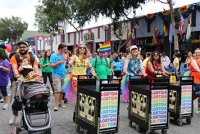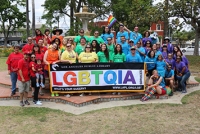LGBTQIA Services at Los Angeles Public Library
Los Angeles Public Library, Calif.
Innovation Synopsis
The LGBTQIA Services Committee was founded by staff seeking to improve library service to the LGBTQIA community. The committee welcomes staff of all levels, gender identities and sexual orientations to participate in outreach, staff sensitivity training, community partnerships, collection development and offering system-wide program and online resources for all ages.
Challenge/Opportunity
The committee observed the unique needs of LGBTQIA users and how they were being underserved within the large system of 73 libraries.
Challenges included:
- offering services to patrons who are often difficult to identify and reluctant to self-identify during a reference transaction
- a lack of knowledge among staff regarding the special needs of the community
- a lack of library visibility at community events, and
- maintaining a current collection that reflects the needs of this diverse and constantly evolving community.
Key Elements of Innovation
The committee addressed challenges by establishing partnerships with other organizations that support the LGBTQIA community. The committee established a visible presence in the community by consistently conducting outreach at events including Dyke Day LA, LA Pride Parade, and the Transgender Economic Empowerment Project Job Fair. The committee created and distributed system-wide an LGBTQIA Heritage Month Resource Packet, containing sample programs and printable reader’s advisory lists for all age groups. The committee launched a public website where users can access resources, and is currently implementing gender identity and sexual orientation staff sensitivity training.
Achieved Outcomes
The committee conducted a survey of librarians to measure the impact of the Heritage Month Resource Packet: 86 percent of respondents indicated that they gained some or quite a bit of knowledge from the information packet; 80 percent used one or more of the packet’s resources; 47 percent observed a mostly positive response from patrons to programs and displays, while 43 percent observed no response at all; 94 percent referred patrons to the website. The number of LGBTQIA Heritage Month programs increased by 612 percent over the previous year, while staff and volunteer participation in LGBTQIA Pride weekend outreach increased tenfold.


